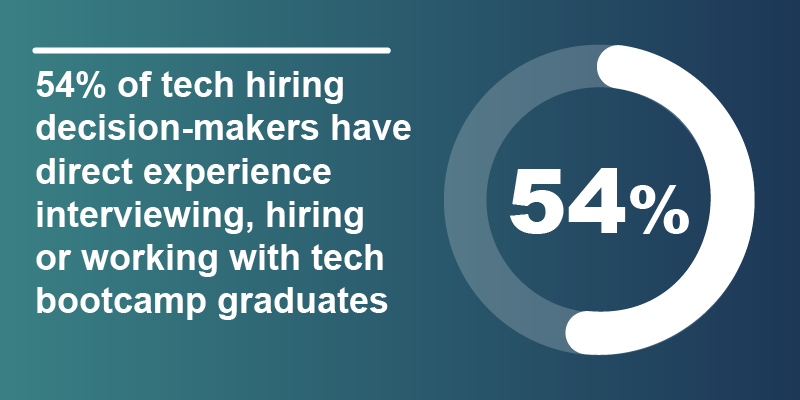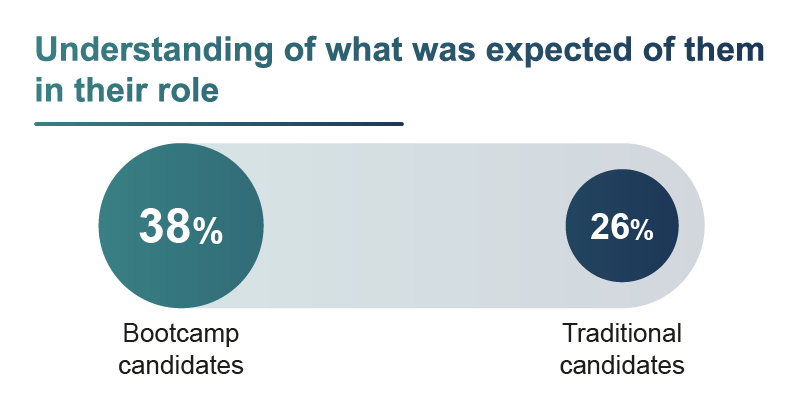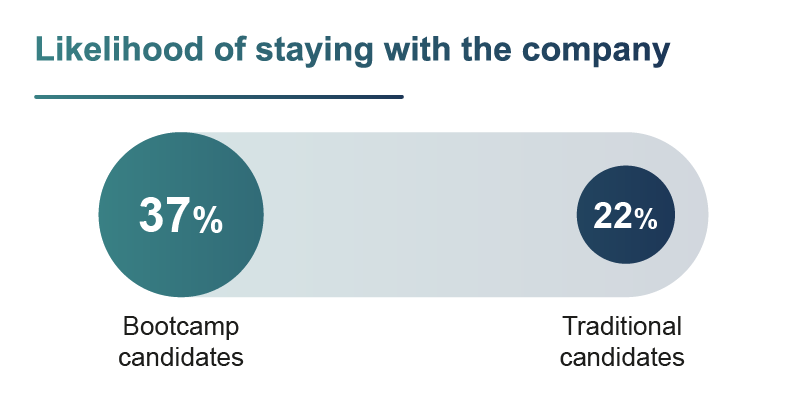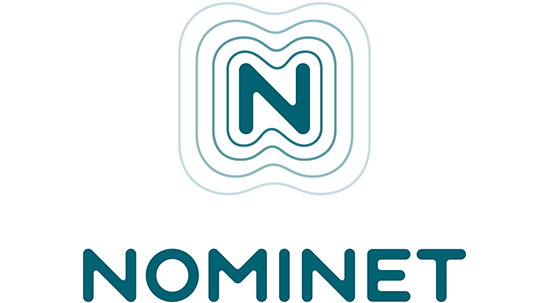Routes to Tech
Looking at alternative digital skills provision

We have a shortage of tech-skilled workers in the UK. Tech job opportunities have hit a 10-year high with the explosion in demand for tech products and services over the past two years, according to new data from Tech Nation. To address this demand, we need to train more people and support them into tech roles starting now and continuing indefinitely and at scale.
Traditional routes to tech, including multi-year university degrees, still have value but cannot produce work-ready talent fast enough to meet the demand. There is a growing need to explore routes to tech through non-traditional digital skills provision, including short courses, bootcamps, and other intensive programmes.
Our review of non-traditional digital skills provision builds upon the skills provision pipeline that is developing in the UK at all levels. For example, in addition to bootcamps and other advanced non-degree programmes, several of the TTC’s Key Partners operate in this space. FutureDotNow’s member organisations help individuals to acquire essential digital skills for work. Charity Tech She Can is designing female-friendly apprenticeship opportunities for school leavers, returners, and beyond, and the Institute of Coding is a consortium of universities and employers designing more flexible, accessible digital skills provision at the higher education level.
Background
The Tech Talent Charter (TTC) is an industry-led, government-funded membership network (700+ organisations), committed to driving diversity and inclusion in tech and securing the future of the tech talent pipeline for all. In our most recent annual Diversity in Tech survey, 580 UK businesses identified the biggest challenges to their D&I efforts. Attracting diverse talent was the most frequently reported issue and in fifth place was tech skills.
In 2021, we began a deeper dive into the topic of routes to tech, developing a multi-phase project that has brought together employers, digital skills providers, and government to capture best-practice, areas of need, and suggested ways forward.
During the first phase of the project, we worked with the Institute of Coding (IoC) and Attest to undertake research to understand how learners from tech/digital skills providers and other alternative routes into tech were perceived by tech hiring managers. The goal of this phase of work was to understand existing levels of awareness and attitudes towards non-traditional (i.e. non-degree) digital skills programmes and providers.
Findings from the initial research
In a TTC survey of 250 working-age people in the UK, we asked hiring decision-makers in tech about different tech skills providers.
Awareness levels
.png)

- Among those who were aware of tech skills providers, paid and free online platforms such as Codecademy and Udemy emerged as the most widely known – 64% had knowledge of programmes. In comparison, 47% knew about recruitment tech skills providers, while 46% were aware of tech skills providers paid for by learners (e.g. Makers, General Assembly, Le Wagon).
- The survey found that younger respondents were less aware of online platforms (54% of under 30s) and recruitment tech skills providers (31%).
- This age cohort also demonstrated less awareness of government-funded training — 39% knew about this, compared with the overall average of 44%. However, these younger individuals were more aware of coding tech skills providers paid for by learners — 53% of under 30s knew about them, compared to the overall average of 46%.
.png)
Impressions
We asked respondents to share their impressions of candidates who’ve taken part in tech skills providers, versus those who entered tech roles through more traditional routes (e.g. degree programmes). For these specific questions, we asked respondents for their impressions of candidates who had taken a digital skills bootcamp programme.
The resulting data shows subtle differences overall. The greatest distinctions in respondent perceptions of candidates versus their traditional counterparts were around understanding of role expectations and the likelihood of staying with a company:

38% of respondents said bootcamp candidates had a better understanding of what was expected of them in their role; when assessing traditional candidates using the same criteria the corresponding figure was 26%

37% of respondents said bootcamp candidates had a higher likelihood of staying with a company; 22% of them believed this of traditional candidates
In all the categories covered in the survey – professionalism, likelihood of staying with a company, technical skills, soft skills, understanding expectations of their job and interpersonal skills – bootcamp candidates performed better than traditional candidates. The smallest divergence was around interpersonal skills – 31% of respondents said bootcamp candidates performed better on these, compared to 30% of their traditional counterparts.
When asked how successful or unsuccessful tech skills bootcamp candidates had been in the hiring process or in their tech role, just 2% of respondents selected ‘unsuccessful’. A sizable 83% chose either ‘mostly successful’ or ‘very successful’, with a further 14% selecting ‘neither successful nor unsuccessful’.
A deeper dive: recommendations from employers and providers
After we compiled the initial research included above, we convened collaborative focus groups of invited providers and employers who have experience in the end-to-end process of various alternative routes into tech roles.
As part of this activity, we sought to examine the available routes to tech and provide advice to help engage more employers with the idea of hiring from tech skills providers. The aim of this phase of work was to contribute to a resource that promotes the different routes to tech to potential employers and help providers and employers bridge the transition from tech training to a career in tech.
These groups collectively identified the opportunities and challenges related to the current offering of non-traditional skills provision in the UK.
Here is a summary of the information we gathered during these collaborative focus group sessions. If you would like to read our full report, you can download it here. Please note that these sessions looked at non-traditional routes broadly, however, bootcamps are the most frequently referenced programme type.

The benefits of working with tech skills providers
In a session, we asked industry participants to provide the potential benefits of alternative tech training provision for their organisation.
Here is a summary of their responses:
- Enables employers to source hard-to-find tech talent, by growing the tech talent pool.
- Newly-trained talent from tech skills programmes tend to have high motivation, enthusiasm and initiative.
- Re-trained talent brings valuable experience from previous career experiences, and greater demographic diversity to the tech talent pool.
- Candidates acquire a good level of tech skill enabling them to do a variety of technical occupations.
Challenges to mitigate for
We asked industry participants to describe the problems or challenges that can occur when hiring from tech skills providers ( e.g. hiring bootcamp learners).
Here is a summary of their responses:
- Tech skills programme hires need to be onboarded with support and investment from their employer, in the form of time, mentoring, coaching, careful management and the opportunity to learn how the work environment and organisational structure operate in virtual and IRL settings.
- The employer and existing staff may have incorrect expectations of the amount of time or support newly trained talent needs to become successful in their new role or underestimate the value they can bring to the team without a traditional tech background or CV.
- Candidate diversity is still limited by the demographics of an employer region and inclusion is still affected by company culture.
- Both candidates and employers have concerns about the cost of using a digital skills programme and who should bear the risk. Due to the structure of certain programmes, the economic risk of training is placed with the candidate or with the employer to pay upfront in the hope of a successful employment match, which is by no means guaranteed.


Hiring tech talent from skills providers: what works?
We asked industry participants and skills providers to describe positive experiences and what has worked for them when hiring bootcamp learners.
Here is a summary of their responses:
- Employers should keep investing in training, onboarding, employee relationship-building, soft skills, professional skills and career planning for new hires, and draw this support from multiple sources in the organisation.
- Help existing employees to understand that digital skills programmes are beneficial for the organisation’s talent strategy, diversity and inclusion efforts and career development opportunities.
- Manage employer and learner expectations throughout every stage of the training and employment journey, including before the training starts and up to a year after the learner is in the role.
- The more tailored the tech skills programme can be to the learner and to the employer, the better the experience. Close collaboration between skills providers and employers is key.
What employers want from digital skills providers
We asked potential end employers what their ‘wishlist’ would be for digital skills programmes and how the providers could support learners into employment.
Here is a summary of their responses:
- Provide training towards holistic and tacit professional skills such as soft skills, communication, technical, project and business environments, project delivery, SDLC, remote vs IRL work, organisational culture and careers advice.
- Provide professional development support and pastoral care during training and the transition to employment and integrate this with the HR practices, culture and support offered by the employer.
- Offer quality guarantees via independent industry certifications, transparent track records of successes and thorough, accessible client feedback and testimonials.
- Providers should work with employers as early as possible; tailoring learning experiences to specific employers enables candidates to have the best opportunity to make a successful transition to employment.
- Provide learners with a variety of funding models to suit different economic needs and a variety of employment opportunities to suit their employment preferences and skills.


Next steps: how the TTC will take this forward
The themes of the information shared in our research and focus groups have been collated into a document that will be presented to the UK Government.
We have collected case studies and industry resources that will support employers as they engage skills providers, and these items will be available on our website in the near future. Also available will be recorded discussion and live events related to digital skills provision and topics like reskilling, returner programmes, and use of the apprenticeship levy.
TTC resources: learn more and access resources from our Open Playbook
You can also view our video on creating alternate routes into tech: employer steps and this video, created with support from Nominet and QA, on routes into tech.
Does your organisation have expertise or interest in this area?
If so, please get in touch if there is a particular topic you would like to explore.
Contributors: thanks to the following individuals and organisations
Focus group participants
Facilitators
Thank you to the following individuals who provided support as a focus group facilitator:
- Sei Moon (Moonstory)
- Maia Nikolova (News Ltd)
- Jess Sandham (Right Track Learning)
- Patricia Pereira (Kobalt Music)
- Kevin Cushnie (Slalom)










